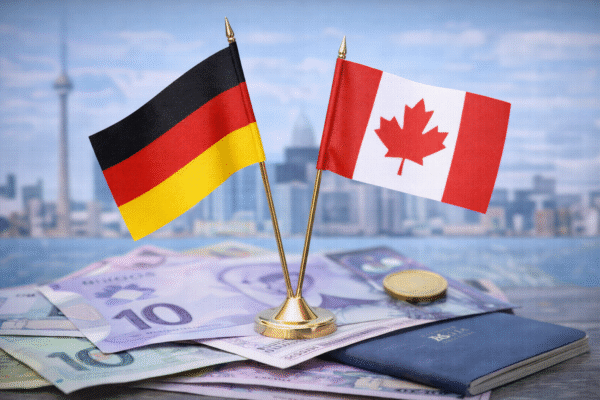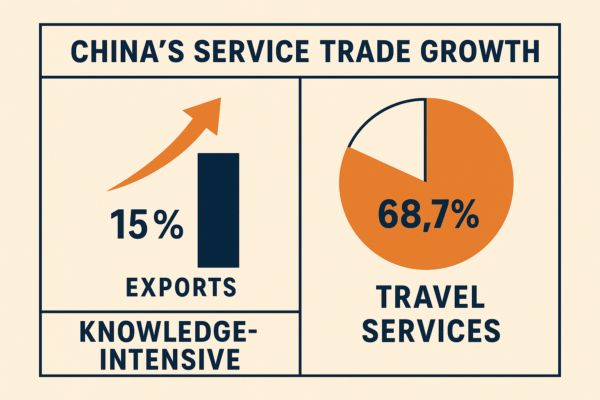BEIJING — China’s service trade registered a robust 8% year-on-year increase in the first half of 2025, underscoring the nation’s pivot toward high-value knowledge-intensive services. Total service trade—imports and exports combined—reached ¥3.89 trillion (≈ US$545 billion), according to data released by the Ministry of Commerce. Service exports rose 15%, reaching ¥1.69 trillion, while imports increased by 3.2% to ¥2.20 trillion, narrowing the trade deficit by approximately ¥152.2 billion compared to H1 2024.
Innovation Drives Service Trade Forward 📈
China’s ongoing economic restructuring is clearly reflected in its service trade performance. Knowledge-intensive services—covering sectors like finance, telecommunications, IT, insurance, and intellectual property—totaled ¥1.50 trillion, up 6% from the previous year. Exports in these segments grew by 7.8% to ¥865.0 billion, while imports inched up 3.6% to ¥637.5 billion, generating a surplus of ¥227.5 billion—an expansion of ¥40.9 billion year-on-year.
These results reflect China’s strategic ambition to build a globally competitive, innovation-driven economy by shifting from traditional manufacturing to technology and intellectual capital exports—a central pillar of national policy frameworks such as “Made in China 2025”, which prioritizes high-tech and digital services.
Travel Services Delivered Explosive Growth
The travel services segment emerged as the strongest performer within the service trade categories. In H1 2025, total travel trade reached ¥1.08 trillion, up 12.3%. Most notably, exports of travel services surged 68.7%, signaling resurgent inbound tourism, strengthened outbound travel by Chinese residents, and expanded cross-border tourism markets.
This exceptional growth mirrors broader domestic consumption rebounds and pent-up demand following pandemic-era travel restrictions, further evidenced by the S&P Global China Services PMI rising to 52.6 in July—its strongest pace since May 2024.
Government Action & Digital Enablers at Play
China has proactively supported service export growth through policy measures such as expanding service trade pilot zones, relaxing foreign access in areas like finance and digital services, and fostering cross-border e-commerce. This policy environment encourages competitive performance in global service markets by domestic innovators and knowledge enterprises.
Additionally, the digital transformation of sectors—leveraging technologies like AI, cloud computing, blockchain, and big data—is reshaping service export structures, enabling efficiency, scalability, and higher-order value creation.
Why It Matters: Economic Resilience & Global Positioning
In a global economy beset by supply chain disruptions, escalating tariffs, and geopolitical friction, China’s service sector provides a smarter, more adaptable engine of growth. Services trade is less vulnerable to tariffs and logistics bottlenecks, relying instead on intellectual capacity and digital infrastructure.
For 2025, China’s GDP grew 5.3% in H1, exceeding its growth target despite U.S.-China trade tensions. Services activity and exports played a stabilizing role amid a weak property sector and sluggish retail consumption.
Outlook: Continued Focus on High-Value Sectors
Key projections indicate that China will maintain its momentum in knowledge-intensive export sectors. Digital services, financial consulting, IP licensing, and travel-related activities are set to remain central pillars of growth. Policymakers and business leaders plan to further cultivate cross-border digital trade, upgrade technology infrastructure, and deepen collaboration with global markets.
Risk factors include potential economic moderation, further trade restrictions, and subdued domestic consumption. But the diversification of service platforms—combined with international demand for digital, cultural, and travel services—positions China advantageously in the global service economy.
Conclusion: China Embraces Service-Led Global Trade Strategy
In the first half of 2025, China underscored its shift from traditional export models to a knowledge-intensive, innovation-powered service economy. With service exports growing 15%, travel services spiking nearly 70%, and knowledge-driven segments expanding steadily, China reaffirmed its transition toward high-value global trade. This trajectory not only reflects domestic reform and policy support but also aligns with broader trends—where digital talent, IP rights, and technology-driven services form the bedrock of international competitiveness.
For more travel news like this, keep reading Global Travel Wire



















